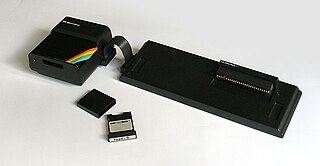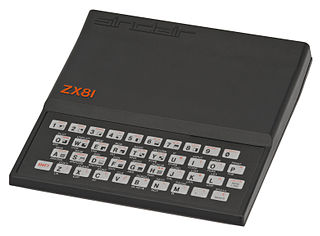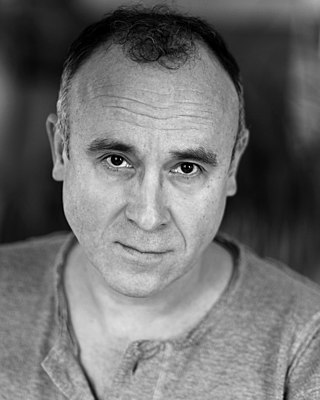Related Research Articles
The Sinclair QL is a personal computer launched by Sinclair Research in 1984, as an upper-end counterpart to the ZX Spectrum.

The ZX Spectrum is an 8-bit home computer developed and marketed by Sinclair Research. Considered one of the most influential computers ever made, it is also one of the best-selling British computers ever, with over five million units sold. It was released in the United Kingdom on 23 April 1982, and around the world in the following years, most notably in Europe, the United States, and Eastern Bloc countries.
Sinclair BASIC is a dialect of the programming language BASIC used in the 8-bit home computers from Sinclair Research, Timex Sinclair and Amstrad. The Sinclair BASIC interpreter was written by Nine Tiles Networks Ltd.

The ZX Interface 1, launched in 1983, was a peripheral from Sinclair Research for its ZX Spectrum home computer. Originally intended as a local area network interface for use in school classrooms, it was revised before launch to also act as the controller for up to eight ZX Microdrive high-speed tape-loop cartridge drives. It also included a DE-9 RS-232 interface capable of operating at up to 19.2 kbit/s. At hardware level it was fundamentally a voltage adaptor, the serial protocol being implemented in software by bit-banging. This led to problems when receiving data, but not when transmitting.

Your Sinclair, or YS as it was commonly abbreviated, was a commercially published and printed British computer magazine for the Sinclair range of computers, mainly the ZX Spectrum. It was in circulation between 1984 and 1993.
Sinclair Research Ltd is a British consumer electronics company founded by Clive Sinclair in Cambridge in the 1970s. In 1980, the company entered the home computer market with the ZX80 at £99.95, at that time the cheapest personal computer for sale in the United Kingdom. A year later, the ZX81 became available through retailers, introducing home computing to a generation, with more that 1.5 million sold. In 1982 the ZX Spectrum was released, becoming the UK's best selling computer, and competing aggressively against Commodore and Amstrad.

Micronet 800 was an information provider (IP) on Prestel, aimed at the 1980s personal computer market. It was an online magazine that gave subscribers computer related news, reviews, general subject articles and downloadable telesoftware.

Lenslok is a copy protection mechanism found in some computer games and other software on the Atari 8-bit computers, Commodore 64, ZX Spectrum, Sinclair QL, MSX and Amstrad CPC. It was created by John Frost, an inventor and electronics consultant, and marketed by ASAP Developments, a subsidiary of J Rothschild Holdings. The first game to use it was Elite for the ZX Spectrum.
Elite Systems is a British video game developer and publisher established in 1984 as Richard Wilcox Software. It is known for producing home computer conversions of popular arcade games. Elite also published compilations of games on the Hit-Pak label and budget price re-releases on the Encore label.

Rick Dickinson was a British industrial designer who developed pioneering computer designs in the 1980s. Notable examples of his design work include the ZX81 case and touch-sensitive keyboard and the ZX Spectrum's rubber keyboard.

Silkworm is a horizontally scrolling shooter developed by Tecmo and first released for arcades in 1988. In 1989, it was ported to the Amiga, Atari ST, Commodore 64, ZX Spectrum, Amstrad CPC and NES (1990) systems by The Sales Curve and released by Virgin Mastertronic.

Graphic Adventure Creator is a game creation system/programming language for adventure games published by Incentive Software, originally written on the Amstrad CPC by Sean Ellis, and then ported to other platforms by, amongst others, Brendan Kelly (Spectrum), Dave Kirby and "The Kid" (C64). The pictures in the demo adventure, Ransom, were made by Pete James and the box cover art by Pete Carter.
Off West End refers to theatres in London which are not included as West End theatres. The term is a relatively recent one, coined after the similar American term "off-Broadway". It is usually used synonymously with the more widespread term Fringe, but sometimes is also used to refer to more mainstream or commercial theatre which is located within London but outside the centre, or to especially small and non-commercial theatres located within the centre. According to London Theatre, "Smaller theatres, including many pub theatres, are called Fringe, although some of these small theatres are also called Off West End, particularly those located in the West End of London, where most of the big commercial theatres are. These small theatres can vary in size, with seating capacities of around 40 to 400."

Patrick Wilde is an English playwright, screenwriter, actor, and director for television, film and theatre.

Southwark Playhouse is a theatre in London, located between Borough and Elephant and Castle tube stations.

Back to the Future is a 1985 video game released by Electric Dreams Software for the ZX Spectrum, Commodore 64 and Amstrad CPC. The game is loosely based on the 1985 film of the same name.
YS MegaBasic is a BASIC programming language interpreter for the 1982 Sinclair Research ZX Spectrum microcomputer, written by Mike Leaman. The interpreter was available by mail-order from Your Spectrum magazine, hence the name "YS MegaBasic".
The Off West End Theatre Awards, nicknamed The Offies, were launched in 2010 to recognise and celebrate excellence, innovation and ingenuity of independent Off West End theatres across London. Over 80 theatres participate in the awards, with more than 400 productions being considered annually by a team of 40 assessors, with the winners chosen by a select panel of critics.

Judge Dredd is a 1991 platform shoot 'em up video game based on the character of the same name. It was developed by Random Access and published by Virgin Mastertronic. It was released in Europe in 1991, for the Amiga, Atari ST, Commodore 64, and ZX Spectrum. Critics found the gameplay repetitive.

The ZX Spectrum Next is an 8-bit home computer, initially released in 2017, which is compatible with software and hardware for the 1982 ZX Spectrum. It also has enhanced capabilities. It is intended to appeal to retrocomputing enthusiasts and to "encourage a new generation of bedroom coders", according to project member Jim Bagley.
References
- ↑ The Type In Fantastic, Jim Grimwood. URL last accessed on 22 March 2007.
- ↑ YS Paperdata, Phil Cornes and Mike Turner. URL last accessed on 22 March 2007.
- ↑ Concurrent Affairs, John Torofex. URL last accessed on 22 March 2007.
- ↑ Sinclair User, QL News. URL last accessed on 22 March 2007.
- ↑ Micro Adventure, John Fraser. URL last accessed on 22 March 2007.
- ↑ My First Programming Book, Alberto Garcia. URL last accessed on 22 March 2007.
- ↑ Your Spectrum Unofficial Archive, Jim Grimwood. URL last accessed on 22 March 2007.
- ↑ YS Frontlines, Your Spectrum. URL last accessed on 22 March 2007.
- ↑ World of Spectrum, worldofspectrum.org. URL last accessed on 20 March 2007.
- ↑ Bergamo, bergamo.it. URL last accessed on 5 April 2007.
- ↑ World of Spectrum, worldofspectrum.org. URL last accessed on 20 March 2007.
- ↑ World of Spectrum, worldofspectrum.org. URL last accessed on 20 March 2007.
- ↑ Wild Justice, wildjustice.org. URL last accessed on 20 March 2007.
- ↑ Indie London, Paul Nelson. URL last accessed on 22 March 2007.
- ↑ Tim Rice's Blondel – Abi Finley and Chris Grierson prepare for curtain up, Jill Hallworth-Smith. URL last accessed on 19 March 2007.
- ↑ Lightning Strikes, Dublin Gay Theatre Festival. URL last accessed on 1 May 2008.
- ↑ Boys Of The Empire, Boys of the Empire. URL last accessed on 25 October 2008.
- ↑ "The Grapes", thegrapes.co.uk.
- ↑ Drowning On Dry Land, Drowning on Dry Land. URL last accessed on 20 May 2014.
- ↑ Parade, Parade. URL last accessed on 20 May 2014.
- ↑ Noel & Gertie, Noel & Gertie. URL last accessed on 20 May 2014.
- ↑ Burlesque, Burlesque. URL last accessed on 20 May 2014.
- ↑ The Pitchfork Disney, The Pitchfork Disney. URL last accessed on 20 May 2014.
- ↑ Mack & Mabel, Mack & Mabel. URL last accessed on 20 May 2014.
- ↑ Victor Victoria, Victor/Victoria. URL last accessed on 20 May 2014.
- ↑ Taboo, Taboo. URL last accessed on 20 May 2014.
- ↑ Titanic, Titanic URL last accessed on 20 May 2014.
- ↑ "Full Casting Announced for CHINESE WHISPERS at Greenwich Theatre".
- ↑ Top rated shows at Edinburgh Fringe, The List. URL last accessed on 27 September 2015.
- ↑ Interview with Pete Shaw, vtravelled.com. URL last accessed on 28 April 2011.
- ↑ V-Flyer Stats, v-flyer.com. URL last accessed on 19 March 2007.
- ↑ Boozr app boosts hospitality with a social network for pub and bar crowd, Daily Express. URL last accessed on 3 September 2021.
- ↑ Social networking app for pub goers Boozr launches on Android and iOS, Tech Digest. URL last accessed on 3 September 2021.
- ↑ App developed during lockdown aims to get customers back to the pub!, Ontrade Progress. URL last accessed on 3 September 2021.
- ↑ Lewisham man creates social-networking app for pub regulars, News Shopper. URL last accessed on 3 September 2021.
- ↑ When will beer gardens reopen? Key dates, and how to find your nearest pub, Metro. URL last accessed on 3 September 2021.